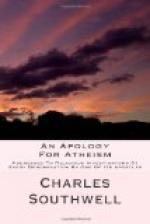and altogether a Being far from respectable, or worthy
to be considered infinite in wisdom, power, and goodness.
Is it credible that a Being supernaturally wise and
good, proclaimed the murderous adulterer David, a
man after his own heart, and commanded the wholesale
butchery of Canaanites? Or that a God of boundless
power, ’whose tender mercies are over all his
works,’ decreed the extermination of entire nations
for being what he made them? Jehovah did all
three. Confessedly a God of armies and Lord of
Hosts; confessedly, too, a hardener of men’s
hearts that he might destroy them: he authorised
acts at which human nature shudders, and of which
it is ashamed: yet to love, respect, yea, reverence
Him, we are commanded by the self-styled ’stewards
of his mysteries,’ on peril of our ‘immortal
souls.’ Verily, these pious anathematisers
ask our credulity a little too much.’ In
their zeal for the God of Israel, they are apt to
forget that only Himself can compass impossibilities,
and altogether lose sight of the fact that where, who,
or what Jehovah is, no man knoweth. Revelation
(so-called) reveals nothing about the imagined creator
of heaven and earth on which a cultivated intellect
can repose with satisfaction. Men naturally desire
positive information concerning the superhuman Deity,
belief in whom is the
sine qua non of all religion.
But the Bible furnishes no such information concerning
Jehovah. On the contrary, he is their pronounced
‘past finding out,’ incomprehensible, and
the like. ’Canst thou, by searching, find
out God? Canst thou find out the Almighty to
perfection?’ are questions put by an ‘inspired
writer,’ who felt the cloudy and unsatisfactory
nature of all human conceit about Gods.
Now, a Revelation from God, at least so thinks the
Author of this Apology, might reasonably be expected
to make the mode and nature of His existence manifest.
But the Christian Bible falls infinitely short in
this particular. It teaches there is a God; but
throws no light on the dark questions, who, what,
or where is God? Numerous and various as are
Scripture texts, none can be cited in explanation of
a Deity no older to-day than he was yesterday, nor
younger to-day than he will be to-morrow; of a Deity
who has no relation to space, not being a part here
and a part there, or a whole anywhere: in short,
of that Deity written about by Bishop Watson, who,
like every other sincere Christian, made the mistake
of resting his religious faith on ’words without
knowledge.’
It is to this description of faith Atheists object.
They think it the root of superstition, that greatest
of all plagues, by which poor humanity is afflicted.
Are they to blame for thus thinking? The Christian
has no mercy on the superstition of the Heathen; and
should scorn to complain when the bitter chalice is
returned to his own lips. Atheists believe the
God of Bishop Watson a supernatural chimera, and to
its worshippers have a perfect right to say, ’not
one of you reflects that you ought to know your Gods
before you worship them.’ These remarkable
words, originally addressed to the Heathen, lose none
of their force when directed against the Christian.




